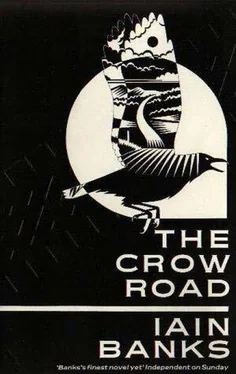Iain Banks - The Crow Road
Здесь есть возможность читать онлайн «Iain Banks - The Crow Road» весь текст электронной книги совершенно бесплатно (целиком полную версию без сокращений). В некоторых случаях можно слушать аудио, скачать через торрент в формате fb2 и присутствует краткое содержание. Год выпуска: 1992, Жанр: Современная проза, на английском языке. Описание произведения, (предисловие) а так же отзывы посетителей доступны на портале библиотеки ЛибКат.
- Название:The Crow Road
- Автор:
- Жанр:
- Год:1992
- ISBN:нет данных
- Рейтинг книги:5 / 5. Голосов: 1
-
Избранное:Добавить в избранное
- Отзывы:
-
Ваша оценка:
- 100
- 1
- 2
- 3
- 4
- 5
The Crow Road: краткое содержание, описание и аннотация
Предлагаем к чтению аннотацию, описание, краткое содержание или предисловие (зависит от того, что написал сам автор книги «The Crow Road»). Если вы не нашли необходимую информацию о книге — напишите в комментариях, мы постараемся отыскать её.
The Crow Road — читать онлайн бесплатно полную книгу (весь текст) целиком
Ниже представлен текст книги, разбитый по страницам. Система сохранения места последней прочитанной страницы, позволяет с удобством читать онлайн бесплатно книгу «The Crow Road», без необходимости каждый раз заново искать на чём Вы остановились. Поставьте закладку, и сможете в любой момент перейти на страницу, на которой закончили чтение.
Интервал:
Закладка:
I'd stayed in Glasgow that Thursday night, completing a paper on the effect of industrial growth on the drive towards the unification of Germany in the eighteenth century; it wasn't actually due in until the following Friday, but I reckoned that slamming the blighter in a whole seven days early would keep the Prof. happy.
I'd turned one of the late Mrs Ippot's first-floor reception rooms into a study, moving a giant oak and leather desk over to the window with the help of Gav and Norris; I'd bought a PC similar to but faster than the machine at Lochgair and plonked it roughly in the middle of the mega-desk, where it looked a bit lost, but clashed nicely. For the essay on German unity, I'd surrounded the computer with a dozen delicately beautiful pieces of Meissen pottery. Whether they had any positive effect on the worth of the paper I don't know, but they were a lot more soothing to look at while I was searching for inspiration than a blinking cursor.
I'd finished the paper about 2am and printed it out. I thought about getting in the car there and then, dropping the paper through the letter-box of a pal who'd take it in to the department for me tomorrow, and then heading for Lochgair. But I was tired, and I'd already told mum I'd be down in the morning; I didn't want to wake her by arriving in the middle of the night.
So I'd had a whisky and gone to bed.
The main bedroom in Mrs Ippot's expansive town house contained a canopied four-poster about the size of a double garage, the sleeping surface of which was about the same height as a mini's roof. The posts were telegraph-pole thick; highly polished mahogany carved into representations of fairies, elves and gnomes, all stacked like little caryatids. I liked to imagine they were the work of an Amerindian totem-pole maker who'd read too much Tolkien.
The centre-piece of the bedroom was a vast chandelier cut from ruby-coloured Murano glass; it hung like a glistening spray of frozen blood from the centre of a gilt-smothered ceiling whose few flat patches were covered in paintings of cherubs and fawns cavorting in a sylvan landscape that appeared to be equal parts Rubens and Disney.
The walls of the room, when not hidden from view by the bed's luxurious (but Islamically abstract) brocade side curtains, were covered with huge Rococo canvases of Venus in various guises, settings and ages, though all shared the same state of déshabillé and a rotundity of figure that must have required the painterly equivalent of soft-focus to appear so leniently attractive.
Where the walls did not glow with acres of flesh, they reflected that golden voluptuousness with great gilt-frame mirrors which almost visibly strained the walls they hung on, and which, I couldn't help but notice, also provided rather a good view from and of the silk-sheeted bed. I'd understood Mrs Ippot had been elderly and frail when she died, but I rather hoped she'd had more fun in the bed than just lying there contemplating the condign punishment I'd decided she had devised for her immediate family (certainly I had yet to share the space between those sheets with anybody, though the bedroom's sheer scale and stateliness did lend masturbation an air of solemnity and arguable dignity the apprehension of which had previously quite passed me by). Even the bedside tables were Chippendale; one of them was topped with a large cut-crystal Venetian vase which I kept fruit in, when I remembered. Otherwise it played host to the little lump of concrete that had been part of the Berlin Wall, which Ashley had given to me over a year earlier.
The bedroom also contained the greater part of Mrs I's collection of camphor-wood chests; a few too many, perhaps. Despite the visual and tactile splendour, olfactorily it was like sleeping in a chemist's.
However, the sad truth is that being surrounded by art treasures designed to excite the eye, gladden the gland and animate the avarice does not guarantee a full night's kip. I'd woken at about half-six, lain there restlessly for a bit, then given up trying to get back to sleep and got up to have some toast and a cup of tea.
I'd put the TV on in the kitchen and found we were at war.
I sat and watched it for a while; heard the CNN guys in Baghdad, saw the reporters report from Saudi airfields, listened to the studio pundits gibber about surgical strikes and pinpoint accuracy, and discovered that, these days, war is prosecuted, not waged. Actually, both words struck me as possessing greasily appropriate connotations in the circumstances.
"Fuck it," I said to myself. What was telephoning somebody you hardly know on the other side of the planet and asking them impertinent questions about their sex life, compared to this gratuitous malfeasance? I strode up the stairs to the reception-room study, determined to make the phone call.
I settled on the direct approach and the truth about myself.
And Lachy Watt put the phone down on me.
Maybe he just wanted to get back to the TV and watch our exciting Third World War for a bit.
I'd stayed in the Lochgair house over Hogmanay itself. We had plenty of drink in, and mum and I had prepared loads of food, but not many people actually visited after the bells. Verity went to bed about ten past midnight after struggling to stay awake from about ten o'clock. She had a very small glass of whisky at the bells. Some people from the village came in about one, Aunt Tone and Uncle Hamish arrived about two for half an hour of strained conversation, and some of James's pals called in after four, but mostly it was just mum, Lewis, James and I together. James conked out about six, but Lewis and I were determined to see the dawn come up just on principle.
We sat in the conservatory, talking and listening to CDs on the gateaux blaster, which I'd brought down with me from Glasgow because it sounded better than the Golf's own sound system (which anyway didn't include a CD player). We were drinking whisky, chasing it with pints of mineral water; pacing ourselves. Lewis felt we were both starting to nod off at one point and so suggested a game of chess. I mooted for the River Game, but we'd have had to have dug the board and everything out and read through all the rules, so we decided chess would be simpler.
"I've been too sensible," I told him, while pondering a pawn exchange.
"Sensible?" Lewis sounded surprised. "You?"
I grinned. "Well… Look at me; I'm studying, I'm living quietly, I'm coming home to mother each weekend… I even bought a sensible, reasonably cheap car. All that money I got… " I shook my head. "I'm twenty-two; I should have blown it all on floozies or dangerous drugs, or just took off round the world, or bought a Ferrari."
"You can't buy a Ferrari for forty grand," Lewis said, chin in hands, studying the board.
"I didn't say it had to be a new one."
Lewis shrugged. "Well, you've still got most of the dosh. Go ahead; go do some of that stuff."
"Yeah, but I sort of promised mum I'd get this degree."
"Okay, so wait till the summer and then do it."
"But mum'll just worry if I get a fast car."
"So take off round the world."
"Yeah. Maybe. I might."
Lewis looked up at me. "What are you intending to do, anyway, Prentice?" He grimaced, stretched, rubbed his face. "I mean, are you still just going to wait and see who's recruiting graduates and then take what sounds like the best job, or have you settled on something yet? Something you actually want to do?"
I shook my head. "Still open, that one," I said. I took the pawn Lewis had offered. He looked vaguely surprised. "I still like the idea of just being a historian," I told him. "You know, ideally. But that means staying in academia, and I don't know if that's what I want. Somehow I don't think they let you go straight from graduation onto prime-time TV with a twenty-six part dramatised history of the world."
Читать дальшеИнтервал:
Закладка:
Похожие книги на «The Crow Road»
Представляем Вашему вниманию похожие книги на «The Crow Road» списком для выбора. Мы отобрали схожую по названию и смыслу литературу в надежде предоставить читателям больше вариантов отыскать новые, интересные, ещё непрочитанные произведения.
Обсуждение, отзывы о книге «The Crow Road» и просто собственные мнения читателей. Оставьте ваши комментарии, напишите, что Вы думаете о произведении, его смысле или главных героях. Укажите что конкретно понравилось, а что нет, и почему Вы так считаете.












